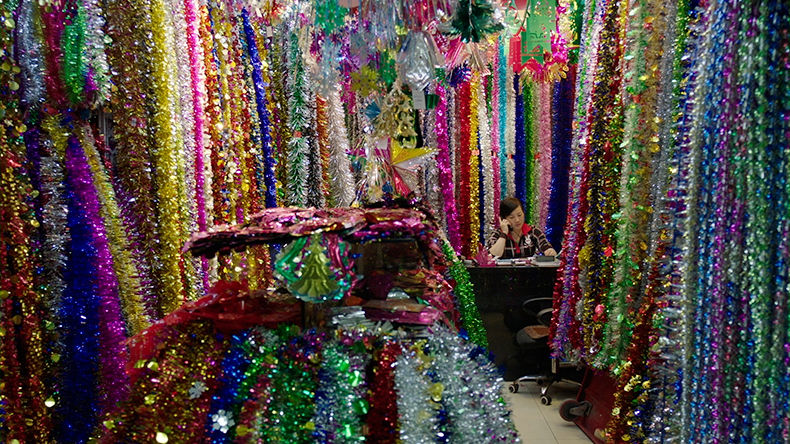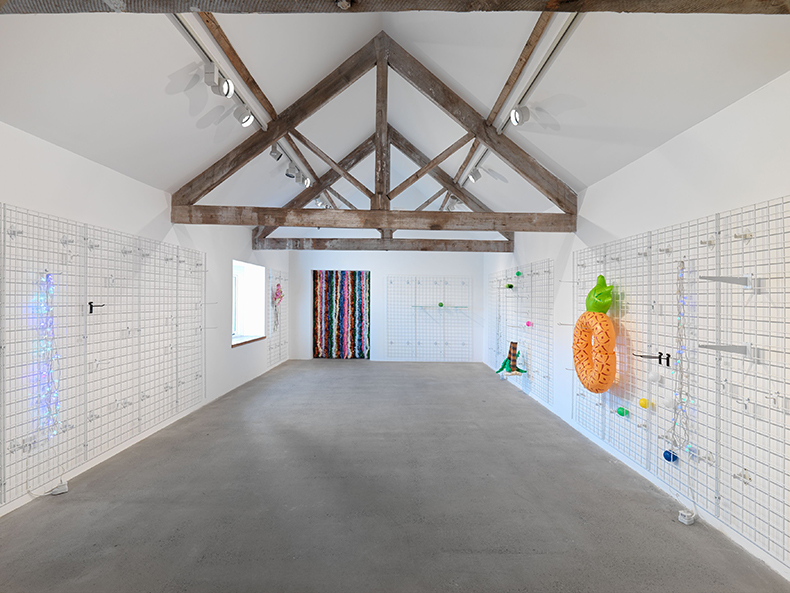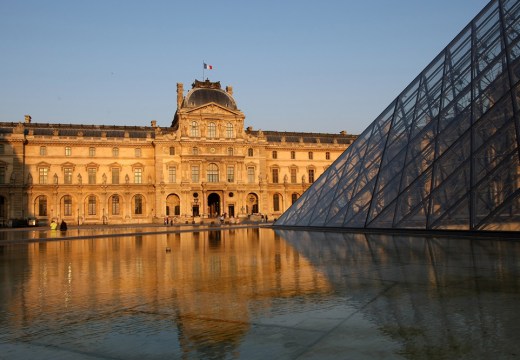In Mika Rottenberg and Mahyad Tousi’s film Remote (2022), a woman goes about her daily routine at home alone – making breakfast smoothies, reading, exercising, watering plants, leaving food outside the door of a neighbour, washing up, work calls. She never leaves her building (a high-rise in Kuala Lumpur), but once a day she stands by her window and joins an off-screen chorus of cheering, clapping and clanging pots and pans. So far, pretty familiar. But Remote is not a portrait of Covid-19 lockdown. In fact, it’s set in the future, in the year 2039. There are hints of not only a global health crisis but also climate crisis: our protagonist, Unoaku, reads a news report about ‘the first recorded sighting’ of a once-common type of whale in more than ten years. Against this dystopian backdrop, a mystery unfolds: while watching a popular TV programme fronted by a Korean dog groomer, Unoaku discovers that she is one of a small group of people around the world seeing events in the show that others cannot. Despite their isolation, the group realise they are connected – not just metaphorically, but in a real, if potentially supernatural, sense.
Remote is being shown at Hauser & Wirth Somerset as part of a screening programme accompanying ‘GRUPPENAUSSTELLUNG’, an exhibition of more than 20 artists on the gallery’s roster (until 1 January 2024). Alongside the feature-length film, Rottenberg will present other works, including a version of the video installation Cosmic Generator (2017) and a selection of drawings and kinetic sculptures. As she tells me during our video call in late May, she is most excited about developing a new sculptural series – the 3D-printed pieces haven’t been fabricated in time for the opening, but she hopes they’ll be added to the outdoor section of the exhibition by September. ‘We’re designing water fountains in the shape of funny creatures, we’re experimenting with 3D printing large- and small-scale sculptures from reclaimed waste plastic. The idea is to take something toxic and make it into something regenerative, which can nurture the gardens. And the gardens in Somerset are so amazing, they’re an artwork in their own right.’

Cosmic Generator (video still; 2017), Mika Rottenberg. Photo: © Mika Rottenberg; courtesy the artist and Hauser & Wirth
This limited sample of the Argentine-Israeli artist’s body of work, which stretches back to the mid 1990s, reflects one of her enduring preoccupations: the connections between people, places and matter in our contemporary era. The impulse to show how everything is linked is what led Rottenberg to moving image, the medium for which she is best known, in the first place: ‘It was the beginnings of hyperglobalisation and the internet. I was making paintings but I felt stuck. Then I moved to New York and discovered video. It’s flat, like painting, but there’s the ability to combine different elements and worlds.’ In Remote, hidden pin-sized portals bring together Unoaku and her international party of TV-watching friends; Cosmic Generator features subterranean tunnels between locations in China and on the Mexico-California border. (In the case of Remote, it’s all ‘movie magic’, as Rottenberg likes to put it: the whole film was shot in New York.) The artist’s diagrammatic drawings and mechanical sculptures – a rotating finger, a bouncing ponytail – are like storyboard images or props from the bigger film projects.
For most of her career, Rottenberg has tried to reflect how the world really is, concocting fantastical scenarios – long-haired women milking their locks in Cheese (2008); men expelling live rabbits from their noses in Sneeze (2012) – that are allegories for the absurd mechanisms of globalisation and technocapitalism. (She grew up on a kibbutz, which, she suggests, might be why she is so attuned to issues of labour and production. Marx came later, at university: she describes Das Kapital as a ‘poetic text’, which ‘says so much about the relationship between humans and the material world’.) But recently, she has been questioning the value of creating artworks that merely ‘mimic in order to examine’ the systems that govern our lives. ‘The year 2016 was a big rupture because suddenly fiction became reality and reality became fiction, and I didn’t feel so comfortable mixing them in my work – the president of the United States was doing it better. Now I’m like, can I invent something new?’ Hence the idea of making recycled plastic fountains, which she describes as ‘trying to work with a different system that is regenerative rather than harmful’.

Installation view of Cosmic Generator (2017), Mika Rottenberg. Photo: © Mika Rottenberg; courtesy the artist and Hauser & Wirth
Rottenberg and her studio team have also been paying more attention to the environmental effects of her own productions. She is closely involved in Artists Commit, an artist-led group pushing for climate action in the US art sector. Earlier this year she collaborated with the organisation to publish a ‘Climate Impact Report’ detailing the carbon footprint of her solo show at Hauser & Wirth in Los Angeles. In Somerset, the gallery’s Education Lab will present a programme around environmental sustainability, inspired by Rottenberg. ‘Right now I think we’re doing okay,’ she says. ‘For sets, we’ve been trying to re-use walls. We minimise shipping.’ She acknowledges that ‘art has such a small footprint’ but insists that ‘it’s really about the culture that we create’. It all goes back to the idea of systems – do we continue to operate within the maddening, destructive systems that are handed down to us, or do we try to forge new ones? ‘Artists invent their own systems,’ Rottenberg argues.
Whatever (eco-friendly) direction her practice takes next, there is no risk of Rottenberg abandoning her distinctively strange brand of humour. Even Remote, despite the darkness of its premise, is filled with laugh-out-loud moments, mostly involving the devoted fans who congregate online every day to watch a woman grooming her dog on TV. ‘There’s a certain distancing that humour creates,’ Rottenberg says. ‘I’m not comfortable being righteous or didactic, which makes me feel like I’m trapped in the subject. Humour is my authentic place.’ With that in mind, I can’t wait to see the water-spouting creatures she has dreamed up for the gardens in Somerset. But don’t mistake the silliness for unseriousness – in the art of Mika Rottenberg, it’s laughter that helps the medicine go down.
‘GRUPPENAUSSTELLUNG’ is at Hauser & Wirth Somerset until 1 January 2024.
Unlimited access from just $16 every 3 months
Subscribe to get unlimited and exclusive access to the top art stories, interviews and exhibition reviews.














![Masterpiece [Re]discovery 2022. Photo: Ben Fisher Photography, courtesy of Masterpiece London](http://zephr.apollo-magazine.com/wp-content/uploads/2022/07/MPL2022_4263.jpg)
‘He wasn’t edgy. He was honest’ – on the genius of David Lynch